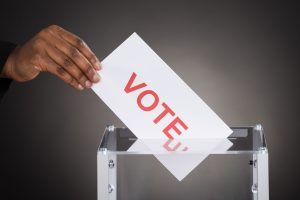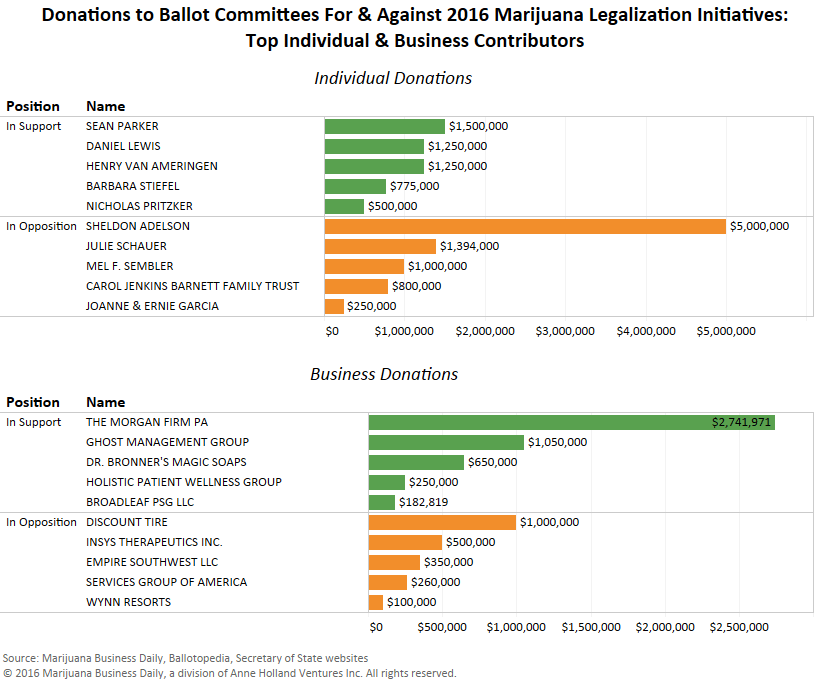The cannabis industry scored a landslide victory Tuesday as four states legalized recreational marijuana and another three approved medical use, cementing the 2016 election’s place in the history books.
The developments could lead to $7 billion-$8 billion in additional annual retail cannabis sales, according to Marijuana Business Daily’s preliminary estimates.
California, Maine, Massachusetts and Nevada voted to legalize recreational marijuana, while Arkansas, Florida and North Dakota approved medical cannabis initiatives.
Montana, which legalized medical marijuana in 2004, also passed a measure to set up commercial cultivation operations and dispensaries.
“It’s a coast-to-coast landslide,” said James Anthony, a cannabis business attorney in California. “We’re well beyond the tipping point. It’s full-steam ahead.”
The only loss: A recreational legalization proposal in Arizona failed at the ballot box. There are also big questions about how Donald Trump, who won the presidency, will approach the marijuana business.
Despite the failure of Arizona’s measure and the uncertainties tied to Trump, the election will go down as a huge victory for the industry given the number of states that legalized and the potential size of those markets.
In addition to a surge in retail sales, the new states will help create billions of dollars in revenues in other areas of the industry, tens of thousand of jobs and scores of opportunities for both existing and new cannabis businesses in the coming years. (See Marijuana Business Daily’s feature story Thursday for a look at the broader implications of the election as well as a state-by-state breakdown of estimated retail revenues.)
It will likely take several years for these markets to get fully up and running, and the additional $7 billion-$8 billion in annual retail sales for the industry might not materialize until 2020 or beyond.
But the new states will push the industry forward by leaps and bounds.
The biggest win came in California, where an initiative to legalize adult-use cannabis garnered 56% of the vote as of early Wednesday morning (final results are not yet available). California’s marijuana market could eventually generate more than the $3.5 billion-$4.3 billion in retail sales that the Marijuana Business Factbook estimates the entire cannabis industry will post this year .
“We are truly looking at the next gold rush,” said Khurshid Khoja, principal at Greenbridge Corporate Counsel, a Sacramento-based law firm serving the marijuana industry.
Other highlights from the election:
• Florida passed a medical cannabis legalization measure by a huge margin, with 71% voting in favor. That’s well over the 60% threshold it needed to hit under Florida law. It also represents the highest percentage of votes in support of a state marijuana legalization measure in history, edging out the 70% that voted in favor of recreational cannabis in Washington DC two years ago.
The state’s massive population and heavy concentration of seniors could make it one of the largest MMJ markets in the country.”This is where plants are grown,” said prominent Florida attorney John Morgan, who bankrolled the campaign to legalize in the state. “It’s tailor-made for this crop.”
• Massachusetts passed a recreational cannabis legalization proposal despite stiff resistance from some high-profile politicians who lobbied against it. With almost all the votes tallied as of early Wednesday morning, the initiative had 53% support.
• Nevada legalized recreational marijuana, which will help create a cannatourism mecca in Las Vegas.
Aside from state ballot measures, two Colorado cities voted on cannabis-related initiatives.
In Denver, a measure to allow marijuana consumption at certain businesses held a razor-thin lead as of early Wednesday but was too close to call.
In Pueblo, technical problems delayed election results by hours, leaving the status of a measure to ban recreational businesses unclear.
Chris Walsh, John Schroyer and Bart Schaneman contributed to this report.




